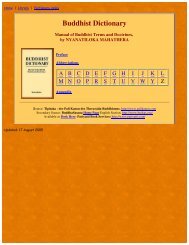The Three Basic Facts of Existence II: Suffering (Dukkha) - Buddhist ...
The Three Basic Facts of Existence II: Suffering (Dukkha) - Buddhist ...
The Three Basic Facts of Existence II: Suffering (Dukkha) - Buddhist ...
- No tags were found...
You also want an ePaper? Increase the reach of your titles
YUMPU automatically turns print PDFs into web optimized ePapers that Google loves.
consciousness, as the four mental groups, are dukkha, a little introspection is needed to showwhether this is so, or not. A person who just drifts mentally (as most people who undertake nomental spiritual training do), has a distracted and confused mind. His mind is not very clear tohim as it is more or less blanketed by delusion (moha), so he does not see dukkha. But one whois prepared to do something about his mind, realising the need for control and cultivation, willsoon know dukkha. None <strong>of</strong> the mental groups are even as stable as the body. Feelings,memories, thoughts and the sense-consciousnesses arise and pass away with extraordinaryrapidity and “what is impermanent, that is dukkha.” Moreover, the meditator strives for onepointedness<strong>of</strong> mind but the mind is usually the scattered arising and passing <strong>of</strong> these fourgroups—not at all concentrated. He will soon learn the dukkha inherent in a scattered mind.<strong>The</strong> examination in ourselves that “the five grasped at groups are dukkha” is the best way toget near to seeing dukkhaṃ ariyasaccaṃ—the Noble Truth <strong>of</strong> dukkha. A <strong>Buddhist</strong> who hopes toget something done during this life on the Dhamma-path should strive at least to see this truth.When dukkha is “in-seen” then one has the best <strong>of</strong> motives for the practise <strong>of</strong> Dhamma. Withthe in-seeing <strong>of</strong> dukkha one will want to see the causes for its arising and therefore be preparedto loosen one’s grip on the pleasurable things <strong>of</strong> this world. When one has gone so far,practising the Noble Eightfold Path, its the causal way <strong>of</strong> Dhamma, then Cessation <strong>of</strong> dukkha,or Nibbâna, will come within ones sight.As Prince Mahā Mongkut wrote when he was Lord Abbot <strong>of</strong> Wat Bovoranives:<strong>Dukkha</strong> is this fivefold group,craving for being its arising;Of it cessation is Nibbāna,the Noble Path to it eightfold.This brief survey <strong>of</strong> dukkha may be concluded by a review <strong>of</strong> what can be done to cope with it.Birth, in the ordinary sense <strong>of</strong> this word, is a past event in this life, but one should aim thatfuture births (if one is not going to finish the job in this life) should not be such great dukkhathat one cannot practise the Dhamma. This can be ensured by making good kamma now. Decayis mostly physical dukkha (pain) and must be accepted but it will be very helpful to do this ifthe mind has been cultivated so that mental dukkha (grief) does not arise. <strong>The</strong> same is true <strong>of</strong>disease, for a person with a cultivated mind will not add to the dukkha he feels by indulgence inself-pity, blaming others, or in bitterness. Death loses its sting when it is accepted as natural.“Whatever has the nature to arise, all that has the nature to cease,” a concise Dhamma-teachingfound many times in the Suttas and one to be realised in oneself. Mental dukkha—fear andworry about death is more painful for some people than the body’s actual death. <strong>The</strong> mind canbe trained and developed to that dukkha does not arise there even though bodily pain becomesvery great. Sorrow can be cut <strong>of</strong>f entirely by mental development in Dhamma and if this isdone, one will have no cause for lamentation either. Physical pain is inherent in the body andmust be borne when it cannot be cured; but one will be unperturbed if the mind does not graspat it as “belonging to me.” Mental grief pertains to the untrained mind but is lessened to theextent that one makes efforts to train in the way <strong>of</strong> Dhamma, while it is abolished by theArahants who have seen the falsity <strong>of</strong> grasping at selfhood. Despair, also a mental condition,will be left behind with craving and unknowing, for no despair can arise for those who havedeveloped energetic mental striving in themselves. Association with the disliked, separationfrom the liked, and not getting what one wants, are all bound up with desires. Lessen desiresand these aspects <strong>of</strong> dukkha become less. Get rid <strong>of</strong> desires and they are got rid <strong>of</strong>. <strong>The</strong> fivegrasped-at groups are both physical and mental dukkha for people who grasp at them. Whengrasping ceases, the mental dukkha associated with this ceases and they become then the fivepure groups which continue to operate from the time <strong>of</strong> the Arahant’s Enlightenment until his13
















